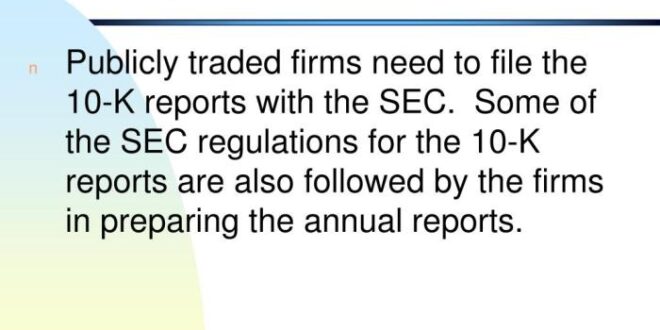SEC regulations, a cornerstone of the financial world, play a pivotal role in safeguarding investors, fostering market transparency, and shaping corporate governance practices. Dive into this comprehensive exploration of SEC regulations, their impact, and their future implications.
Established to ensure fair and orderly markets, SEC regulations have evolved over decades to address emerging challenges and protect the interests of all market participants.
Overview of SEC Regulations

The Securities and Exchange Commission (SEC) is the federal agency responsible for regulating the securities industry in the United States. SEC regulations are designed to protect investors, maintain fair and orderly markets, and facilitate capital formation.
The SEC was created in 1934 in response to the stock market crash of 1929. The crash revealed that the securities industry was largely unregulated, which allowed for rampant fraud and abuse. The SEC was given broad authority to regulate the securities industry and to enforce the federal securities laws.
Types of SEC Regulations
The SEC regulates the securities industry through a variety of regulations, including:
- Registration requirements for securities and securities professionals
- Disclosure requirements for public companies
- Anti-fraud provisions
li>Enforcement mechanisms
The SEC also has the authority to investigate securities fraud and to bring enforcement actions against violators of the federal securities laws.
Enforcement Mechanisms
The SEC has a variety of enforcement mechanisms at its disposal, including:
- Civil penalties
- Criminal prosecution
- Injunctions
- Cease-and-desist orders
The SEC can also seek disgorgement of ill-gotten gains and other remedies.
SEC Regulations Impact on Public Companies

SEC regulations have a significant impact on public companies’ financial reporting and disclosure practices. These regulations are designed to protect investors and maintain market integrity by ensuring that companies provide accurate and timely information about their financial performance and operations.
Role in Protecting Investors
SEC regulations play a crucial role in protecting investors by requiring companies to disclose material information that could affect their investment decisions. This information includes financial statements, risk factors, and management discussions and analysis. By providing investors with access to this information, SEC regulations help them make informed investment decisions and reduce the risk of fraud and abuse.
Maintaining Market Integrity
SEC regulations also help to maintain market integrity by ensuring that all investors have access to the same information at the same time. This level playing field prevents insider trading and other unfair practices that could distort the market and harm investors.
Impact on Specific Public Companies, SEC regulations
SEC regulations have had a significant impact on specific public companies. For example, the Sarbanes-Oxley Act of 2002 was enacted in response to corporate scandals such as Enron and WorldCom. This act imposed new requirements on public companies, including stricter financial reporting standards and enhanced corporate governance practices.
These regulations have helped to restore investor confidence and reduce the risk of future financial crises.
SEC Regulations and Corporate Governance

SEC regulations have had a significant impact on corporate governance practices. By establishing rules and regulations for publicly traded companies, the SEC has helped to promote transparency and accountability in corporate decision-making.
One of the most important ways that SEC regulations have influenced corporate governance is by requiring companies to disclose more information about their operations and finances. This disclosure helps investors to make informed decisions about whether or not to invest in a company, and it also helps to hold companies accountable for their actions.
SEC Regulations and the Role of Corporate Boards
SEC regulations have also played a role in strengthening the role of corporate boards. By requiring companies to have independent directors on their boards, the SEC has helped to ensure that boards are more objective and less likely to be influenced by management.
In addition, SEC regulations have given boards more authority to oversee management. For example, the SEC requires boards to approve major transactions and to review the company’s financial statements.
SEC Regulations and the Behavior of Corporate Executives
SEC regulations have also influenced the behavior of corporate executives. By imposing penalties on executives who violate the law, the SEC has helped to deter misconduct and to promote ethical behavior.
In addition, SEC regulations have required executives to disclose more information about their compensation and their personal finances. This disclosure helps to ensure that executives are not enriching themselves at the expense of shareholders.
International Implications of SEC Regulations
The extraterritorial application of SEC regulations has had a significant impact on international companies and markets. The SEC’s reach extends beyond U.S. borders, affecting foreign companies that list their securities in the United States or have significant operations in the U.S.
One of the challenges created by the extraterritorial application of SEC regulations is the potential for conflicts with foreign laws and regulations. For example, the SEC’s requirement that companies disclose certain information about their operations may conflict with foreign laws that protect corporate secrecy.
This can create a difficult situation for companies that are trying to comply with both sets of regulations.
Despite the challenges, the extraterritorial application of SEC regulations has also created opportunities for foreign companies. By complying with SEC regulations, foreign companies can gain access to the U.S. capital markets and attract U.S. investors. This can help them to raise capital and grow their businesses.
Impact on Foreign Companies
- Increased costs of compliance
- Reduced access to U.S. capital markets
- Increased risk of litigation
Examples
- In 2015, the SEC charged a Chinese company with fraud for failing to disclose that it had been the subject of an investigation by the Chinese government.
- In 2016, the SEC settled with a Brazilian company for $35 million for failing to disclose that it had made payments to government officials.
- In 2017, the SEC charged a Canadian company with insider trading for using non-public information to trade in the company’s stock.
Future of SEC Regulations
The future of SEC regulations is uncertain, but there are a number of potential changes that could be made in the coming years. These changes could be driven by a variety of factors, including the increasing complexity of the financial markets, the rise of new technologies, and the changing needs of investors.
One potential change is that the SEC could become more focused on regulating the conduct of financial professionals. This could include requiring financial professionals to meet higher standards of education and training, and to disclose more information about their conflicts of interest.
The SEC could also increase its enforcement efforts against financial professionals who engage in misconduct.
Another potential change is that the SEC could become more focused on regulating the use of new technologies in the financial markets. This could include developing new rules to govern the use of artificial intelligence, blockchain technology, and other emerging technologies.
The SEC could also work with other regulators to develop a more coordinated approach to regulating the use of new technologies in the financial markets.
Finally, the SEC could become more focused on regulating the needs of investors. This could include developing new rules to make it easier for investors to understand the risks and rewards of investing, and to make it easier for investors to file complaints against financial professionals.
The SEC could also work with other regulators to develop a more coordinated approach to protecting investors.
The future of SEC regulations is uncertain, but the SEC is likely to continue to play an important role in regulating the financial markets. The SEC will need to adapt to the changing needs of the financial markets and the needs of investors.
The SEC will also need to work with other regulators to develop a more coordinated approach to regulating the financial markets.
Drivers of Regulatory Change
There are a number of factors that could drive changes to SEC regulations in the future. These factors include:
- The increasing complexity of the financial markets.
- The rise of new technologies.
- The changing needs of investors.
- The increasing globalization of the financial markets.
- The changing political landscape.
The SEC will need to consider all of these factors when developing new regulations.
Implications for Businesses and Investors
Changes to SEC regulations could have a significant impact on businesses and investors. Businesses will need to be aware of the new regulations and make sure that they are in compliance. Investors will need to be aware of the new regulations and make sure that they are making informed investment decisions.
The SEC will need to carefully consider the implications of any new regulations on businesses and investors before implementing them.
Emerging Trends and Challenges
There are a number of emerging trends and challenges that the SEC will need to consider when developing new regulations. These trends and challenges include:
- The increasing use of artificial intelligence and other new technologies in the financial markets.
- The increasing globalization of the financial markets.
- The changing needs of investors.
- The increasing complexity of the financial markets.
- The changing political landscape.
The SEC will need to address these trends and challenges in order to develop effective regulations that protect investors and promote the stability of the financial markets.
Outcome Summary
As the regulatory landscape continues to evolve, SEC regulations will undoubtedly remain a critical force in shaping corporate behavior, protecting investors, and maintaining the integrity of global markets.
FAQs
What is the primary purpose of SEC regulations?
SEC regulations aim to protect investors, maintain fair and orderly markets, and facilitate capital formation.
How do SEC regulations impact public companies?
SEC regulations influence public companies’ financial reporting and disclosure practices, promoting transparency and accountability.
What is the role of SEC regulations in corporate governance?
SEC regulations promote transparency and accountability in corporate decision-making, ensuring that boards and executives act in the best interests of shareholders.
How do SEC regulations affect international companies?
SEC regulations have extraterritorial reach, impacting the operations of foreign companies that trade in U.S. markets or raise capital from U.S. investors.
What are the potential future changes to SEC regulations?
Future changes may address emerging technologies, climate-related disclosures, and the evolving role of digital assets in the financial markets.
 Nenroll Nenroll News
Nenroll Nenroll News













